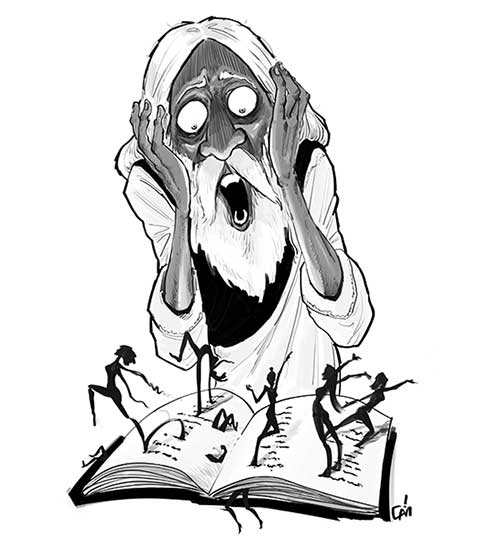Lust in translation
Updated: 2015-12-21 07:57
By Raymond Zhou(China Daily)
|
||||||||
 |
|
[Photo by Cai Meng/China Daily] |
There's a fine line between imprinting creative works with unique personality and screaming for attention. Feng Tang just crossed it, when he translated Tagore's tranquil verse into a vulgar selfie of hormone saturated innuendo.
Classical literature deserves more than one translation.
Rarely does one language have the exact equivalent for every word, phrase or concept in another language.
So even the best translators have to choose what is most important or relevant in the original and attempt to find the expressions in the target language deemed to overlap the most with the original. The choices can be subjective.
Rabindranath Tagore is Asia's foremost literary titan, revered throughout the world and very much beloved in China. There are many Chinese versions of his poetry, so it is not surprising one more would appear.
But a recent take made headlines, not only because the translator is himself a man of letters but also because of the personal spin the translator inserted in the text.
Stray Birds is a collection of Tagore's lyrical poems known for their simplicity and sublime beauty.
The poet published them while he was well into middle age, but they aren't age-specific. If one has to check to determine the age of the person who wrote a body of verse, I'd say they're reading a mature poet with no need to follow conventions. The language flows like a mountain stream, with no hint of artificial tinkering or mannerisms.
Never in a thousand years would I guess there was a horny teenager behind these lines. Thanks to the new Chinese translation, I was jolted out of my complacency.
The translator, Feng Tang-the pen name of Zhang Haipeng-is considered a crossover wunderkind. He was a medical professional by training but veered toward management consulting after getting a Master of Business Administration at Emory University. Deep in his heart, he probably always wanted to be a master of literature.
Above all, he comes across as a testosterone-driven lad obsessed with one thing and one thing only. That's not a problem when he writes his own novels and poems.
But this time, he's translating someone else's words as if they were his own. Take this line: "The great Earth makes herself hospitable with the help of the grass." Feng's rendition is: "Because of green grass, the great Earth becomes quite horny."
Does "hospitable" in this context carry an active sexual innuendo?
Dumb as I am, I honestly cannot fathom it.
But in the eyes of someone proud of his "bulge", it must be an implication waiting to be taken aboveground.
As a matter of fact, "bulge" is a buzzword that seeps into all of Feng's writings, including his translations, to the point the mere mention of the word becomes associated with him. It has become his de facto trademark.
Now, the translation of this next line has turned into an instant classic, for ridicule rather than for appreciation. Tagore's original says: "The world puts off its mask of vastness to its lover. It becomes small as one song, as one kiss of the eternal." But Feng's take is: "The wide world unzipped its crotch to its lover. Long as a tongue kiss, small as a line of a poem."
As with all translation, you gain some and you lose some.
The previous Chinese version, published in the 1920s, was brushed aside by Feng as too flat. It sticks very closely to the original except for the title of the collection. Instead of Stray Birds, it translates as Flying Birds instead-a moot point noticed by Feng.
- 10 execs suspected of faking pollution data
- Top 10 social media events of 2015
- Life sentences for east China child traffickers
- Shenzhen leaps to top of efficiency list in 2 yrs
- Pandas prefer choosing their own sex partners, researchers find
- Tycoons exchange views on building a cyberspace community of shared future
- Iraq holds its first beauty contest in 40 years
- Libyan factions sign UN deal to form unity government
- World's refugees and displaced exceed record 60 million
- No specific, credible terror threats against US: Obama
- UN Security Council adopts resolution to cut off Islamic State funding
- California shooters' ex-neighbor charged with supporting terrorists

 Iraq holds its first beauty contest in 40 years
Iraq holds its first beauty contest in 40 years
 Highlights at the Light of the Internet Expo
Highlights at the Light of the Internet Expo
 Finger Icons: Guess who's who
Finger Icons: Guess who's who
 Older mother who lost only child delivers another baby
Older mother who lost only child delivers another baby
 Top 10 most attractive FDI destinations in the world
Top 10 most attractive FDI destinations in the world
 Canadian college offers flying classes to legless girl
Canadian college offers flying classes to legless girl
 Fashion buyer scours the world for trendy items
Fashion buyer scours the world for trendy items
 Tycoons exchange views on building a cyberspace community of shared future
Tycoons exchange views on building a cyberspace community of shared future
Most Viewed
Editor's Picks

|

|

|

|

|

|
Today's Top News
Shooting rampage at US social services agency leaves 14 dead
Chinese bargain hunters are changing the retail game
Chinese president arrives in Turkey for G20 summit
Islamic State claims responsibility for Paris attacks
Obama, Netanyahu at White House seek to mend US-Israel ties
China, not Canada, is top US trade partner
Tu first Chinese to win Nobel Prize in Medicine
Huntsman says Sino-US relationship needs common goals
US Weekly

|

|







